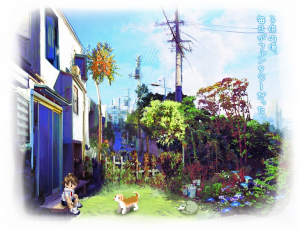 Sakura Note
Sakura Note is a short game, only about 4 or 5 hours long, so I finished it quickly once I put my mind to it. I had some harsh words for it last time, but the story improved dramatically in the last two chapters and the ending was very sweet, so I feel a lot more charitable towards it now.
Charitable enough that I’m starting to wonder why it sold so poorly. I can think of plenty of games that should have sold worse than this. Even accounting for the fact that the game starts slowly and doesn’t get interesting until it’s almost over, more than 4,000 people should have picked it up before negative word of mouth got out.
This is my own speculation, but they probably didn’t market it enough to the right people. Actually it’s worse than that: there are no right people because the game is too kiddy to appeal to adults and too adult to appeal to kids. To get all technical, it’s a short reflection on the helplessness of childhood, written from an adult’s perspective. There aren’t many people who would want to play something like that. Maybe only about oh, 4,000 worldwide.
Slow beginning aside, the story was decent enough that they it would have worked out if they had cut down the adult involvement and transformed it into a Ghibli-style children’s adventure movie. It should be about 1 hour long once you minimize the unnecessary dross. This is harder than it sounds though, because “toning down adult involvement” would mean scrapping the whole story and starting afresh, since the story is powered by the selfish, short-sighted decisions of all the parents in Sakura Note.
First, the cherry tree itself: Started all the trouble by blooming when she shouldn’t have. She was doing this to send power (“ki”) to her withering offspring in the next town. Even after being informed that the “ki” was pooling in the town and causing demons to materialize, she refused to stop. Probably the most sympathetic of the lot, since it must be hard to sit by and do nothing while your child is dying.
 Next, and worst of all, Sakura Kikichi: The weird old man with the weird face. Caused all this trouble by signing a contract with the demon possessing the tree in the next town. When the contract expires after 200 years, the demon wakes up and starts to cause trouble.
Next, and worst of all, Sakura Kikichi: The weird old man with the weird face. Caused all this trouble by signing a contract with the demon possessing the tree in the next town. When the contract expires after 200 years, the demon wakes up and starts to cause trouble.
Selfishness one, why didn’t he leave any records about how to renew the contract? In fact, even before that, why did he insist on planting a cursed cherry tree? Sure it’s pretty, but there are thousands of other tress in Japan that aren’t possessed. Now his whole family is bound to the stupid contract in perpetuity, or would have been if we hadn’t broken the cycle.
Not only that, but in order to get permission to make the cutting he had to make offerings to the shrine with the original tree, offerings that included his daughter’s pet pig as food. Poor daughter and poor pet pig, whose spirit hung around the shrine lost and confused for 200 years before re-materializing as the first boss you fight. It doesn’t get much more pathetic than that.
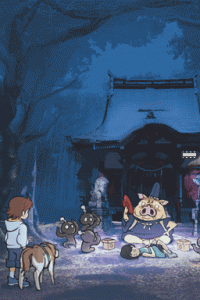 Selfishness four/five: making the contract requirement so hard to fulfill. The demon asked for the tears of the person he valued most. Stupid Kikichi chose to use “happy tears.” How easy would that be to duplicate? When was the last time you cried tears of joy? Okay. When was the last time you cried tears of joy on command? Yeah, I thought as much.
Selfishness four/five: making the contract requirement so hard to fulfill. The demon asked for the tears of the person he valued most. Stupid Kikichi chose to use “happy tears.” How easy would that be to duplicate? When was the last time you cried tears of joy? Okay. When was the last time you cried tears of joy on command? Yeah, I thought as much.
Selfishness number 2 million and one: once he realized the contract was up and forced his way back to the land of the living, what exactly was his plan for saving the tree? Did he seriously think abducting Nanami would work? It would take several more paragraphs to explain what his “plan” i.e. “no plan” was, but anyone with half a brain can appreciate that you don’t get people to shed happy tears by knocking them out and kidnapping them.
Selfishness number I lost count: Not explaining himself to people who could understand him. Adults couldn’t see him, but Sakura and the hero could see him just fine. Once they got over their fear of him, it wouldn’t have taken that much time to explain the problem. Contract, tree, next town over, happy tears, let’s go. Simple. Instead he hems and haws and dashes to and fro and only explains himself to a cat, which has to struggle to make itself understood by humans. Kitty’s reward for its trouble? Death. And it’s all Kikichi’s fault.
Kikichi is the worst of the bunch, and the entire story involves cleaning up his massive mess, but the other adults are unpleasant in their own way.
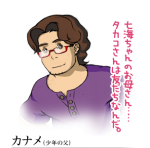 Main character’s dad, Kaname: Doesn’t let on that Nanami’s mom is his ex-girlfriend, doesn’t even tell his wife who she is or introduce his supposed “childhood friend” to his family. Sneaks out to meet her at all times of the day under the guise of “helping her adjust” to life as a divorcee, yet still has the nerve to insist they’re “just old friends.” Takes over the game and becomes virtual hero of the second half, then messes up and leaves the final legwork to his son. A more obvious writer self-insert character I have never seen. A failure as a father, husband and human being.
Main character’s dad, Kaname: Doesn’t let on that Nanami’s mom is his ex-girlfriend, doesn’t even tell his wife who she is or introduce his supposed “childhood friend” to his family. Sneaks out to meet her at all times of the day under the guise of “helping her adjust” to life as a divorcee, yet still has the nerve to insist they’re “just old friends.” Takes over the game and becomes virtual hero of the second half, then messes up and leaves the final legwork to his son. A more obvious writer self-insert character I have never seen. A failure as a father, husband and human being.
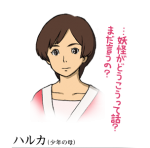 Main character’s mom, Haruka: Passive-aggressive to a fault. Confronting Kaname about his sneakiness might not have helped, but it would at least have brought matters into the open much earlier and spared us at least 2 hours wasted on sulking, screaming and general hysteria. It might also have stopped her from physically abusing her son only to later lean on him wailing “Don’t leave me! I have nobody else!” No wonder he’s a messed up college student in the epilogue.
Main character’s mom, Haruka: Passive-aggressive to a fault. Confronting Kaname about his sneakiness might not have helped, but it would at least have brought matters into the open much earlier and spared us at least 2 hours wasted on sulking, screaming and general hysteria. It might also have stopped her from physically abusing her son only to later lean on him wailing “Don’t leave me! I have nobody else!” No wonder he’s a messed up college student in the epilogue.
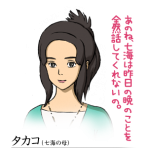 Nanami’s mom, Takako: Ulterior motives up the wazoo. Only agreed to date Nanami’s dad because she was mad at her ex-boyfriend, Kaname. Made her grand decision to divorce her husband, only to go lean on Kaname for “moral support.” Avoids meeting Kaname’s family for as long as she can and never lets on that they dated once. Doesn’t see anything wrong with getting her ex to fork out for the posh penthouse suite where she lives with the daughter she won’t let him see.
Nanami’s mom, Takako: Ulterior motives up the wazoo. Only agreed to date Nanami’s dad because she was mad at her ex-boyfriend, Kaname. Made her grand decision to divorce her husband, only to go lean on Kaname for “moral support.” Avoids meeting Kaname’s family for as long as she can and never lets on that they dated once. Doesn’t see anything wrong with getting her ex to fork out for the posh penthouse suite where she lives with the daughter she won’t let him see.
Nanami’s dad, Takashi: Quit his job and started a new business without telling his wife. She overreacted by immediately asking for a divorce, but then he underreacted by immediately agreeing, forking over a large settlement and not asking to see his daughter. Instead he hangs around outside their apartment like a stalker, hoping for… what? Saves the day by going back into the past to retrieve happy tears, so he’s forgiven a little.
With the help of the dead cat (;__;), the main character taps into the power of his favorite superhero and defeats the demon once and for all. Takashi nourishes the tree with Nanami’s happy tears and the day is saved. After all that, Takako, having messed up Kaname’s marriage to her satisfaction, decides to stay behind with Takashi and Nanami and talk things over. When the game flashes forward a year later, everyone seems to be happy and things seem to have worked out for all the families. It was a lovely ending, and I’m afraid I’m not doing the feel-good factor justice… because I read the epilogue.
The unhappy ending (the epilogue)
If you earn 800 tear points in chapter 4, you get to watch an epilogue set 12 years in the future. Do not do this if you liked the ending. Don’t, don’t, don’t, don’t, don’t! I can’t advise against it strongly enough.
The main character enters university, where he fails badly enough to be held back a year. I didn’t even know it was possible to be held back in college, but it’s established from the start that he’s a bad student, so no surprise there. Nanami and Takashi are not mentioned at all.
More importantly, Kaname and Haruka are divorced, and Kaname and Takako are either married or shacking up together. That’s not to say Takako was to blame for breaking up Kaname’s marriage, or vice versa. Kaname could have gotten divorced for a variety of reasons, Takako might be widowed, and they might still be “just friends” even now. Highly unlikely, but it’s possible.
That said, the writers must have been aware of what a bad aftertaste it leaves when large chunks of the story are devoted to unnecessary family drama, everything seems to be resolved and then it all falls apart anyway for no explained reason. The happy ending is the one little thing they had going for them, and they had to ruin even that. No wonder Sakura Note bombed.
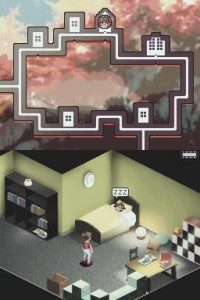 Other miscellaneous complaints
Other miscellaneous complaints
If I have spent most of my discussion of this game talking about the story, that’s because that’s the only thing worth mentioning about this game. The gameplay is simple and unchallenging, and I finished the final battle almost unscathed. The battle system needed a lot of work. You have only one attack, you get penalized for defending and there’s no HP bar for bosses. That blue bar at the top is not the HP bar, so you have no idea whether you’re doing any real damage until the boss suddenly drops dead.
The various NPCs and other characters you meet along the way ultimately have no real relevance to the story, and neither does the endless family melodrama when all is said and done. The people who do most of the suffering – your dog, your cat, Nanami, main character, Takashi – are all either poorly rewarded or outright punished for their hard work.
Other problems include:
– The length. 4 hours might be too short for some, but I respect the developers for not dragging the game out. To give gamers their money’s worth though, they should have added more replayability somehow.
– The inability to skip or forward scenes, in a game that expects you to play each chapter at least twice for full completion.
– The slow walking speed.
– You’ll miss a considerable chunk of story if you don’t unlock the optional scenes.
A Japanese site classified Sakura Note as a kuso (shitty) game, and I can’t blame them. The age when bad games could sell based on name recognition alone is well and truly over.
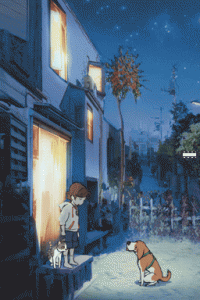
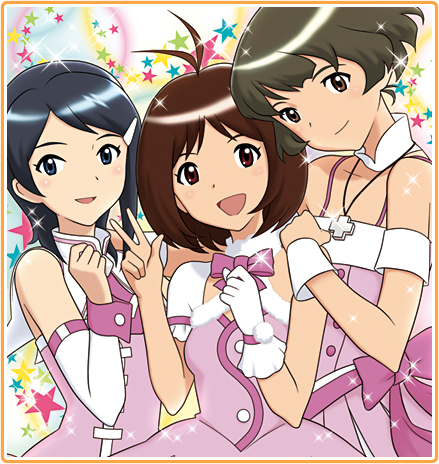
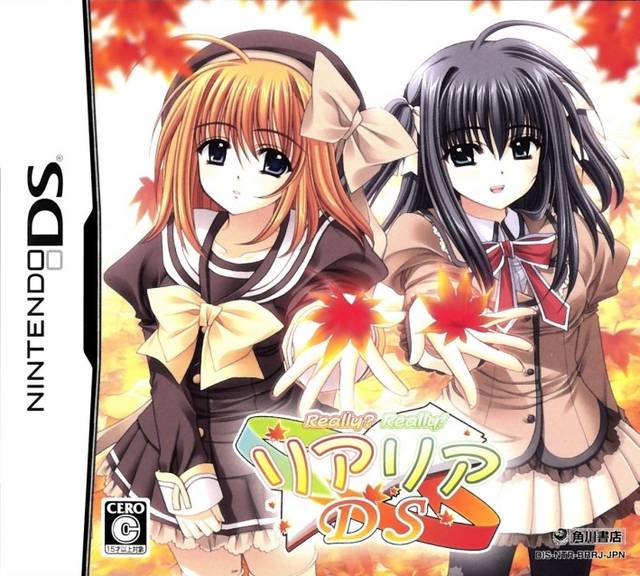
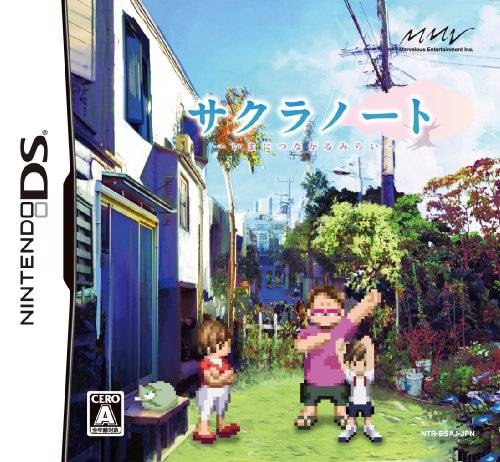

[…] have to clear Sakura Note, Tokyo Mono Hara Shi and Arc Rise Fantasia (the battle system is good) off my plate before getting […]